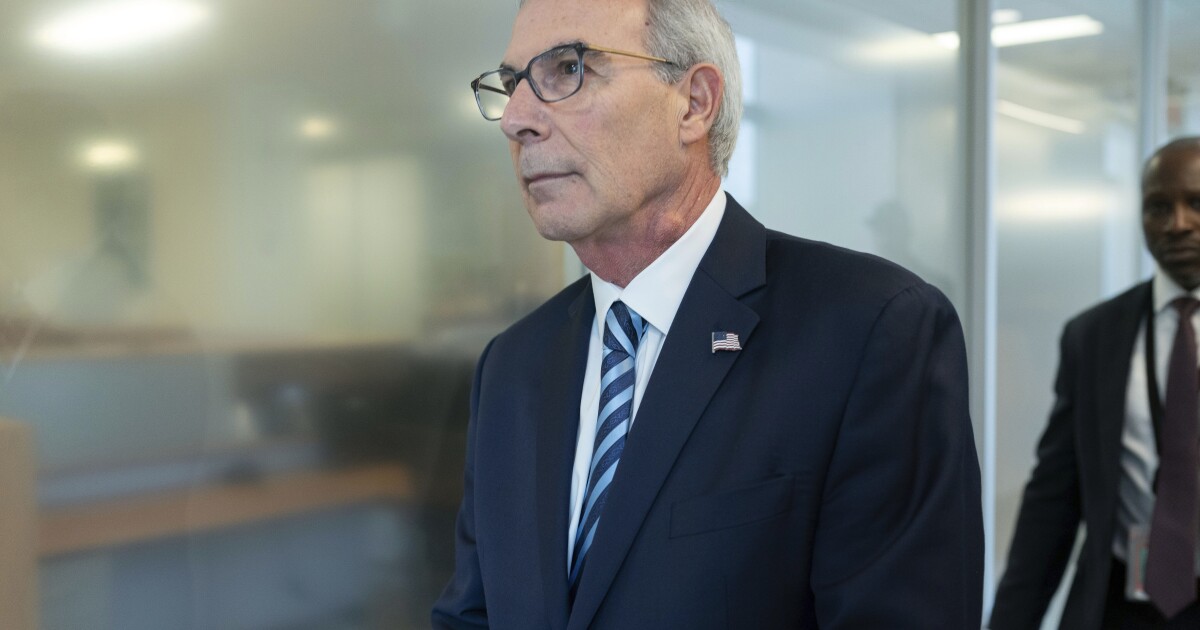

Special counsel David Weiss faced hours of questioning in a closed-door interview on Capitol Hill on Tuesday, covering topics about his authority level in the Hunter Biden case and whether he had allowed statutes of limitations on tax crimes to expire at the benefit of the president’s son.
Weiss, the lead prosecutor in the case, began the morning by telling the House Judiciary Committee that he “at no time” has ever been blocked from pursuing charges in his investigation, according to a transcript of his opening comments obtained by the Washington Examiner.
DEMOCRATS SPOOKED AFTER BIDEN SHOCK POLL AND FRET TRUMP WHITE HOUSE COMEBACK
The special counsel’s opening remarks addressed one of the focal points for House Republicans as they investigate claims that the Department of Justice has slow-walked the case and that the investigation has been plagued by political bias.
The allegations of prosecutorial misconduct originated from a pair of veteran IRS criminal investigators who approached Congress in the spring with concerns about abnormalities they said they had witnessed while working on the case. One of their key claims was that Weiss, who was leading the investigation out of Delaware at the time, told them last year that he had asked DOJ headquarters to grant him the authority to bring tax charges in other jurisdictions but that his request had been denied.
Two U.S. attorneys appointed by President Joe Biden told the committee in recent months that they both declined to partner with Weiss on charges against Hunter Biden in their respective districts, but neither said they believed their decisions would permanently stop Weiss from advancing the case.
When House Judiciary Committee Chairman Jim Jordan (R-OH) emerged from the interview room Tuesday afternoon, he said that contrary to Weiss’s opening statement, Weiss said later in the interview that he asked for elevated authority early last year and was denied it.
In a conflicting account, however, a source familiar with the interview said Weiss insisted multiple times that he was never met with any denials and that he specifically addressed the moment Jordan was referencing by telling the committee that it was “not a denial in any way, shape, or form.”
The issue of Weiss’s authority has become so pertinent because, according to the pair of whistleblowers, the IRS and Weiss’s prosecution team had been in agreement through at least February 2022 that they wanted to charge Hunter Biden with tax-related felonies and misdemeanors for the years 2014 to 2019.
Aside from two now-dropped misdemeanors for 2017 and 2018 that appeared in a plea deal Weiss offered Hunter Biden this summer, none of those charges have materialized. Questions of political bias have since surrounded the prosecution.
While Weiss is expected to still bring some tax charges against Hunter Biden, the whistleblowers said that charges for at least 2014 and 2015 were no longer options because their statutes of limitations had lapsed. Weiss confirmed on Tuesday that they had lapsed for those years, according to another source with direct knowledge of his testimony.
House Republicans are continuing to investigate where any breakdown may have occurred within the DOJ, and Weiss’s interview is one of several they have conducted or plan to conduct as part of their inquiry.
Weiss’s testimony in particular was an extraordinary occasion. The DOJ noted ahead of it that a special counsel testifying before the conclusion of their case was “unprecedented” and warned the scope of Weiss’s interview would be limited to him addressing questions about his authority level.
The interview was long, lasting roughly six hours, but the second source familiar said it was not a “fulsome” six hours because Weiss frequently declined to answer questions.
CLICK HERE TO READ MORE FROM THE WASHINGTON EXAMINER
This has been a recurring theme this year in the committee’s interviews with DOJ employees, who are bound by the department’s longstanding policy on withholding non-public information about open investigations.
Weiss, in any case, will be required to submit a report to Attorney General Merrick Garland detailing his prosecutorial decisions once his investigation has concluded, and Garland has vowed to share the report with the public.





